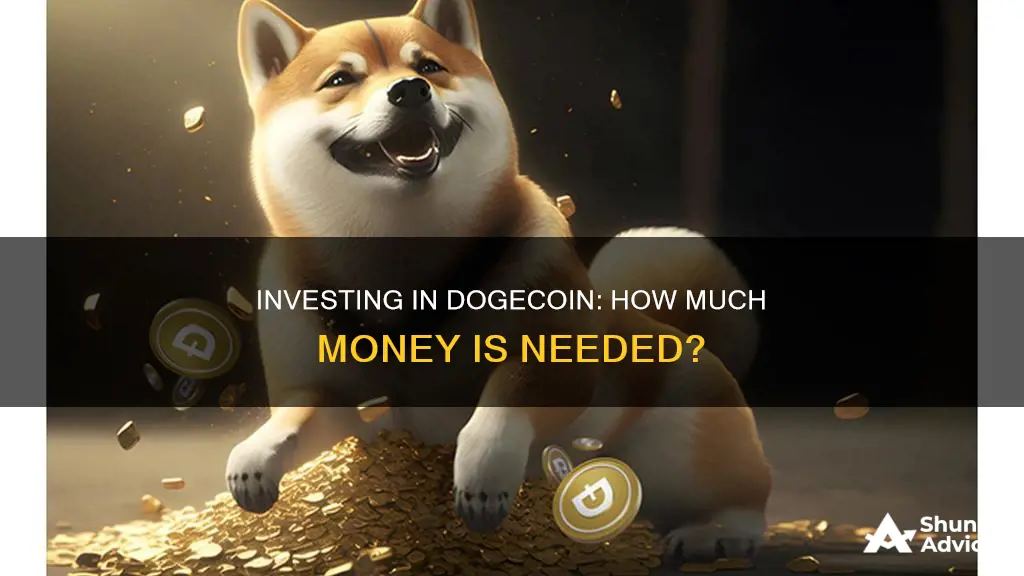
Dogecoin is a cryptocurrency that was created in 2013 as a lighthearted alternative to traditional cryptocurrencies like Bitcoin. It was initially intended to be a joke, but it has since gained traction and become one of the larger cryptocurrencies by market cap. Dogecoin is a risky and volatile investment, and its value is largely driven by social media movements and hype. Before investing in Dogecoin, it is important to understand the risks involved and ensure that you are in a strong financial position. In this article, we will discuss the pros and cons of investing in Dogecoin and provide guidance on how to get started if you decide to invest.
| Characteristics | Values |
|---|---|
| Risk | Dogecoin is a risky, volatile investment |
| Energy-intensity | Dogecoin uses proof-of-work technology, which is energy-intensive |
| Price | Dogecoin is prone to extreme fluctuations in value |
| Affordability | Dogecoin is one of the more affordable cryptocurrencies on the market |
| Transaction costs | Dogecoin has low transaction costs |
What You'll Learn

Dogecoin's value and volatility
Dogecoin is a highly volatile cryptocurrency. Its value is largely driven by public sentiment and trends, rather than technological advancements, which makes it unpredictable and susceptible to fluctuations that may not correlate with project milestones or achievements.
Dogecoin's value has experienced significant highs and lows since its creation in 2013. In 2021, Dogecoin became one of the larger cryptocurrencies by market cap, with a total value that topped $80 billion, even though each coin was worth pennies. This surge in value was partly due to endorsements by celebrities such as Elon Musk, Mark Cuban, and Snoop Dogg. Dogecoin's peak price of 74 cents in May 2021 was a result of this revival.
However, Dogecoin's value has also seen significant declines. In 2015, it hit its lowest price of $0.0000869. As of August 2024, Dogecoin's price is $0.0832 per coin, a 37.92% decrease in value in the past week, and a 78.59% decrease from its all-time high. Dogecoin's market cap as of August 2024 is $12.25 billion, with a circulating supply of 145 billion coins.
Dogecoin's volatility is often compared to Bitcoin's. In September 2023, Dogecoin exhibited a lower annualized 30-day realized volatility of 30% compared to Bitcoin's 35%. However, historically, Dogecoin has been associated with higher volatility, which has deterred risk-averse investors. Dogecoin's lack of a supply cap and its abundance of coins (10,000 new coins are mined every minute) contribute to its volatile nature.
Overall, Dogecoin's value and volatility are driven by public sentiment, celebrity endorsements, and its abundant supply. While it has experienced significant highs, it has also seen substantial lows, making it a risky investment with unpredictable fluctuations.
Smart Bitcoin Investment: How Much to Invest?
You may want to see also

Dogecoin's affordability
Dogecoin is one of the more affordable cryptocurrencies on the market. This is because it typically trades at prices that are well under $1. In fact, its all-time high was 74 cents in 2021. Dogecoin's affordability is due to its unlimited supply, with 10,000 new coins mined every minute and no maximum supply. This is in contrast to Bitcoin, which is designed to be scarce, with a maximum supply of 21 million.
Dogecoin's low price and unlimited supply make it an attractive option for investors looking to get into the cryptocurrency market. However, it's important to keep in mind that Dogecoin is a risky and volatile investment. Its price is prone to extreme fluctuations, largely driven by social media movements and hype. As such, it should only be purchased if you're in a strong financial position and can afford to lose money.
The process of buying Dogecoin is relatively simple and can be done on a cryptocurrency exchange. Popular exchanges that offer Dogecoin include Coinbase, Gemini, Binance, and eToro. When purchasing Dogecoin, you can choose to pay with fiat currencies like the US dollar or with other cryptocurrencies.
Once you've purchased Dogecoin, you'll need to decide how to store it. You can either use an exchange or a digital wallet. Using an exchange is simpler, but it may leave your assets exposed in cases of crashes or hacks. A digital wallet offers more security but requires more responsibility from the investor. There are two types of digital wallets: hot wallets, which are always connected to the internet and offer more convenience, and cold wallets, which are not connected to the internet and provide more security against online hacks.
In conclusion, Dogecoin's affordability makes it an appealing option for those looking to invest in cryptocurrency. However, its risky and volatile nature means that it should only be considered if you are financially prepared to potentially lose money.
Apple's Bitcoin Investment: Did it Happen?
You may want to see also

Dogecoin's transaction costs
Dogecoin's transaction fees, or withdrawal fees, are necessary to incentivise the network's nodes (miners) to process and validate transactions. These fees are paid to the cryptocurrency's miners to get transactions accepted. The fee also helps to ensure that the transaction is processed quickly and securely.
The fee is usually expressed in satoshis per byte (sat/b) or gas and depends on the current network conditions. Miners prioritise transactions with higher fees, so the fee you pay will determine the speed at which your transaction is processed. During times of high network congestion, the fee may be higher.
Between December 2020 and January 2021, the fee for a Dogecoin transaction increased by over 1500%. This coincided with an increase in Dogecoin transactions and a price surge after tweets from Tesla CEO Elon Musk in early 2021.
The exchange Bitfinex has the lowest Dogecoin withdrawal fee, with a fee of $0.0000000 - 0DOGE. Gate.io has the second-lowest fee of $0.0117255 - 0.100DOGE, while BTSE is the third-lowest at $0.0961490 - 0.82DOGE. Crypto.com has the highest withdrawal fee of the exchanges detected, with a fee of $0.1641568 - 1.4DOGE.
Strategizing Bitcoin Investment: A Long-Term Guide
You may want to see also

Dogecoin's tax implications
Dogecoin is treated as property by the IRS, which means that profits from cryptocurrency transactions are taxable. If you sell Dogecoin for more than you paid for it, you will be taxed on the profits. The tax rate depends on how long you held the Dogecoin before selling it. If you held it for more than a year, you will pay long-term capital gains taxes, which are typically lower than ordinary income tax rates. If you held it for a year or less, you will pay ordinary income taxes, which are taxed at higher rates.
Additionally, if you earn Dogecoin through mining, staking, or as compensation, it is taxed as ordinary income at the time of receipt. If you later sell this Dogecoin for a higher price, you will be taxed on the capital gains.
It is important to note that buying Dogecoin with fiat currency, such as USD, is not a taxable event. However, if you buy Dogecoin using another cryptocurrency, the transaction may be subject to capital gains taxes. For example, if you buy Dogecoin with Bitcoin and the value of your Bitcoin has increased since you purchased it, you will be taxed on the profits from the Bitcoin transaction.
Cryptocurrency received through airdrops and hard forks is also taxed as ordinary income at the time of receipt. If you sell the received cryptocurrency for a loss, you may be able to claim a tax deduction.
The tax implications of Dogecoin investments can be complex, and it is always recommended to consult with a tax professional to ensure compliance with the relevant tax laws and regulations.
A Beginner's Guide to Bitcoin Investment via eTrade
You may want to see also

Dogecoin's storage options
Dogecoin Storage Options
There are several storage options for Dogecoin, each with its own advantages and security features. Here are some of the most popular choices:
- Hardware wallets are physical devices that store your private keys offline, providing an extra layer of security. Examples include the Ledger Nano X or S, and Trezor (Model T or One). These wallets offer robust security features, such as PIN protection, encryption, and backup options, making them less susceptible to online threats.
- Software wallets are digital applications installed on your computer or smartphone, offering convenience and easy access to your Dogecoin funds. Examples include Exodus, Atomic Wallet, and the official Dogecoin Wallet. While software wallets are more susceptible to hacks, they are often free and provide user-friendly interfaces.
- Web wallets are accessible through a web browser and are often provided by cryptocurrency exchanges like Coinbase and Binance. They offer convenience and accessibility but are more vulnerable to hacking and cyber-attacks.
- Paper wallets are a simple and secure way to store your private keys offline. They involve printing your private keys on a piece of paper, which can then be stored in a safe place. While paper wallets are highly secure, they may not be as convenient as other options.
- Multi-signature wallets require multiple signatures to authorise a transaction, adding an extra layer of security.
- Desktop wallets are software wallets installed on your computer, providing local access to your Dogecoin funds. They offer more advanced features but are vulnerable to malware and hacking if proper precautions aren't taken.
- Mobile wallets are applications designed for smartphones, enabling you to access and manage your Dogecoin on the go. Examples include Coinomi Wallet and Trust Wallet, which offer user-friendly interfaces and built-in decentralised exchanges.
When choosing a Dogecoin wallet, it is essential to prioritise security and consider your personal preferences for convenience and accessibility.
BlackRock's Bitcoin ETF: A Guide to Investing
You may want to see also
Frequently asked questions
Dogecoin is a cryptocurrency that was created in 2013 as a lighthearted alternative to traditional cryptocurrencies like Bitcoin. Dogecoin is intentionally abundant, with 10,000 new coins mined every minute and no maximum supply.
Dogecoin is typically priced at under $1, with its all-time high of $0.74 reached in 2021.
The amount of money you need to invest in Dogecoin depends on your financial situation and risk tolerance. Dogecoin is a risky and volatile investment, so it's important to only invest money that you can afford to lose.
You can buy Dogecoin on a cryptocurrency exchange such as Coinbase, Gemini, Binance, or eToro.
You can store your Dogecoin on a cryptocurrency exchange or in a digital wallet, such as a hot wallet or cold wallet.







